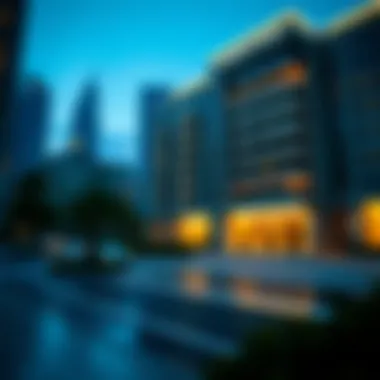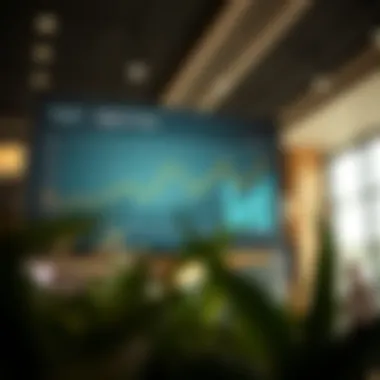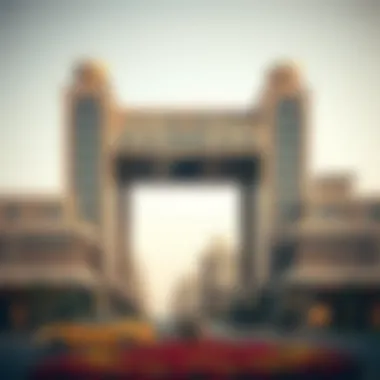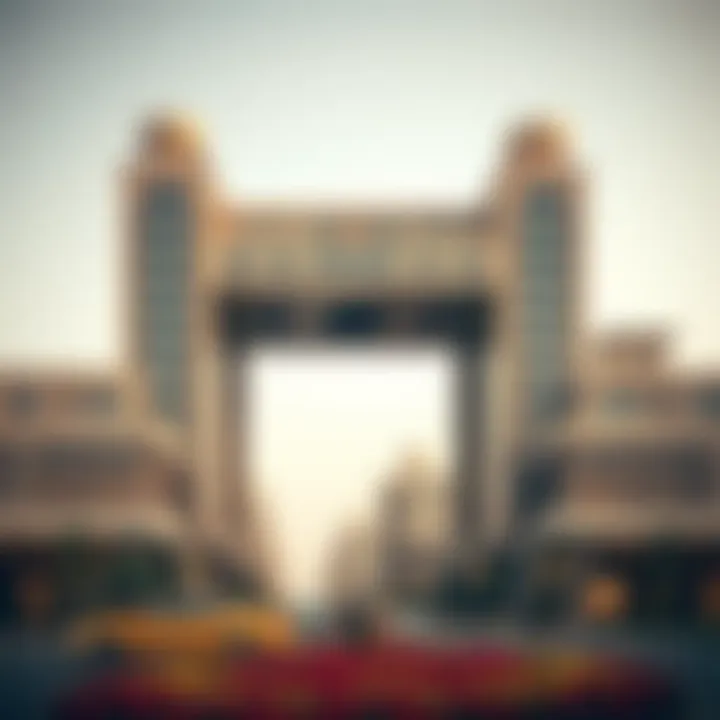Dubai Islamic Bank Zahia: Real Estate Financing Insights


Intro
The landscape of real estate financing in Dubai has undergone significant evolution over the past decade. Among the latest innovative initiatives is the Zahia project, a noteworthy venture by Dubai Islamic Bank that intertwines Islamic finance principles with modern living. This initiative does not merely provide financial products; it shapes a community with an array of opportunities for investors and prospective homeowners.
The Dubai real estate market has become a magnet for both local and international investors, thanks to its strategic location, tax incentives, and a plethora of lifestyle amenities. Investors are looking beyond mere property ownership; they seek comprehensive insights into market trends and the financing options available to them.
This article delves into critical aspects of the Zahia initiative, offering a thorough analysis of market trends, investment opportunities, and the unique offerings of Dubai Islamic Bank. It aims to help readers navigate this complex landscape, making informed decisions in their real estate ventures.
Overview of Dubai Islamic Bank
Dubai Islamic Bank is a pivotal institution in the financial landscape of the UAE, particularly renowned for its adherence to Islamic banking principles. This article aims to dissect its various facets—historical significance, core values, and the strides made in financial innovation—while establishing the bank's critical role in real estate financing within the Zahia initiative.
A Historical Perspective
Founded in 1975, Dubai Islamic Bank emerged as the first Islamic bank and has since laid down a robust framework for Sharia-compliant banking across the region. The idea wasn’t just to create another bank; it was about establishing a new banking tradition rooted in ethical finance. Over the decades, the bank has evolved alongside the socio-economic changes in Dubai, adapting to global financial trends while staying true to its foundational principles. Its historical journey showcases its resilience and client-focused approach, allowing it to grow into one of the largest Islamic banks worldwide.
Core Values and Objectives
At the heart of Dubai Islamic Bank lie its core values: integrity, innovation, and customer focus. These principles govern its operations, ensuring that all financial services adhere to ethical guidelines. The bank unwaveringly aims to support the sustainable growth of the UAE economy by offering products and services that consider the welfare of its clientele. Such commitments foster trust, making the bank not just a financial institution but a partner in customers’ journeys, notably in realizing homeownership through the Zahia initiative.
Financial Innovations
Embracing technology has always been a focal point for Dubai Islamic Bank. The institution has made strides in introducing innovative financial products tailored to meet customer needs, particularly in real estate financing. For instance, its Murabaha and Ijara financing schemes are designed to empower homebuyers while ensuring compliance with Islamic law. Additionally, the bank is also keen on enhancing digital banking experiences, promoting accessibility and efficiency, thereby fortifying its position in an ever-evolving market environment.
„Innovation is not just about creating new products; it’s about rethinking how we deliver value to our clients.”
Through these principles and willful adaptability, Dubai Islamic Bank continues to forge pathways in real estate financing, acting as a critical resource for investors and homeowners amidst the vibrant scenery of Dubai's real estate market.
Understanding the Zahia Initiative
The Zahia initiative represents a pivotal movement within Dubai's vibrant real estate landscape, a project driven by Dubai Islamic Bank to reshape urban living and investment opportunities. Grasping the essence of Zahia involves understanding its conceptual underpinnings, the designed community experience, and the demographic it seeks to attract. Each of these elements interlocks to form a comprehensive vision, promising not just housing but a holistic lifestyle for residents and investors alike.
Concept and Development
Zahia’s core concept revolves around creating a thoughtfully curated community. Envisioned as a harmonious blend of modern living and cultural heritage, it aims to provide a unique slice of urban life in the heart of Dubai. The development process is marked by a commitment to sustainable practices, incorporating green spaces and community areas. This is not merely about constructing buildings; it’s about weaving them into the fabric of a thriving community that fosters connectivity and well-being.
Amidst Dubai’s ever-evolving skyline, Zahia stands as a beacon of innovation. The planning phase pays homage to traditional architecture while embracing modern design principles, creating an inviting atmosphere. It includes parks, recreational facilities, and essential infrastructure, ensuring that residents can enjoy a balanced lifestyle. The emphasis on walking paths and communal areas encourages social interaction, making Zahia a desirable destination for families and young professionals alike.
Community Vision
The vision behind Zahia is not only about what its structures will stand for but what its community will embody. Enabling a sense of belonging is at the forefront of the Zahia project. The developers envision a microcosm where cultures merge, and community spirit thrives.
The concept translates into various features:
- Mixed-use spaces: Integrating residential, commercial, and recreational areas supports a lively atmosphere throughout the day.
- Cultural engagement: Events will be organized to promote local traditions and arts, enriching the community’s cultural tapestry.
- Community health: Green spaces and wellness facilities are designed to promote physical and mental well-being.
Zahia's community vision champions inclusivity, encouraging collaboration among various demographics. This approach not only enhances residents' quality of life but also attracts potential investors who recognize the appeal of a vibrant living environment.
Target Demographics
Identifying the target demographics for Zahia has been a cornerstone of its planning. Pending the rapid pace of urbanization in Dubai, the initiative aspires to cater to a diverse group of people. This includes:
- Young professionals looking for modern, accessible living options close to the business hub.
- Families seeking a safe environment with ample educational and recreational facilities available on their doorstep.
- Investors aiming for profitable opportunities in a sought-after area with a mix of housing and commercial prospects.
In addition, international buyers are also part of the target spectrum, drawn by Dubai's reputation as a global city. Zahia's appealing design and strategic location position it well for attracting these diverse groups.
The Zahia initiative, in essence, is set forth to create not just a place to live but a community to thrive in. Through understanding its conceptual framework, community goals, and target demographics, one can appreciate the substantial potential Zahia holds in the real estate market.
Real Estate Financing Options
In the context of the Zahia initiative, understanding real estate financing options is crucial not just for prospective investors, but also for homebuyers and real estate agents. These financing methods are designed to accommodate the unique financial principles rooted in Islamic banking, thus fostering an environment where dreams of ownership are not just attainable, but also compliant with sharia law.
As the real estate market in Dubai steadily evolves, having a firm grasp of the available financing options allows individuals to make informed decisions. It also contributes to a greater understanding of how these products can facilitate transactions, assist in property acquisition, and serve long-term investment goals. The Zahia project is primed to appeal widely, and knowing the ropes of financial engagements in this sector is paramount.
Murabaha Financing
Murabaha financing is one of the most widely accepted structures in Islamic banking, facilitating the purchase of properties in a straightforward manner. Essentially, the bank buys the asset and then sells it to the customer at a marked-up price, allowing the buyer to pay over a set period. This method is transparent as both parties agree upfront on the purchase price and the profit margin, leaving little room for disputes later.
Key Considerations:
- Transparency: The clear terms of the sale ensure all parties are on the same page.
- Predictable Payments: Fixed payment schedules help individuals plan their finances without surprises, which is important in an ever-changing market.
- No Interest Fees: As a sharia-compliant option, there are no traditional interest charges involved, aligning perfectly with Islamic finance principles.
For example, a couple wishing to buy their first home can leverage Murabaha financing. They approach Dubai Islamic Bank, identify a property priced at AED 1,000,000. The bank purchases this property and sells it to them for AED 1,050,000, which they can pay in monthly installments over a five-year term. Such a method eliminates the uncertainty tied to fluctuating interest rates, providing peace of mind as they navigate their new financial commitments.
Ijara Schemes


Another notable option is the Ijara leasing scheme, which allows customers to lease assets instead of purchasing them outright. In this arrangement, the bank buys the property and leases it to the buyer for a fixed term. The lessee has the option to purchase the property at the end of the lease period. This is particularly appealing for buyers who may not be ready to commit full purchase funds upfront.
Benefits:
- Flexibility: The ability to lease means lower initial capital requirements and the option to reassess financial situations.
- Ownership Potential: At the end of the lease, the tenant can choose to buy the property, which provides a gratifying path toward ownership.
- Ease of Adjustment: Lessees can adjust their living situation without long-term commitments upfront, giving room for life changes and economic shifts.
Consider a young professional working in Dubai’s bustling economy. They may sign a 3-year Ijara contract on a desirable apartment. By the end of the term, they could either choose to buy the property or relocate without the headaches of property initial buy-ins. This adaptability is crucial in the fast-paced environment that Dubai provides.
Islamic Home Loans
Islamic home loans offer a pathway for buyers looking for tailored financing solutions that remain compliant with Islamic laws. Unlike conventional loans which rely on interest, Islamic home loans often employ various structures such as Musharakah (partnership) and Murabaha as discussed before.
Key Features:
- Compliance with Sharia: Ensures no involvement in traditional interest-based transactions, aiming for ethical financing.
- Partnership Model: Allows for shared ownership, where the bank and homeowner jointly own the property until the loan is settled.
- Customized Products: Many banks offer personalized plans to meet the varying needs of potential homeowners, ensuring no one is left out of the dream.
For instance, let’s say an investor is looking to buy a property worth AED 2,000,000. With Islamic home loans, the bank can partner by covering 70% of the cost while the investor pays the remaining 30% as a down payment. They pay rent on the bank's portion as they gradually buy out their share. This shared approach promotes collaboration rather than a confrontational debtor/creditor relationship, fostering a stronger community environment.
In summary, as the landscape of Dubai real estate continues to shift, understanding these financing options can empower buyers and investors alike, creating opportunities that might once have seemed out of reach. Strong financial literacy in this area not only enhances individual prospects but also contributes positively towards the sustainable growth of the Zahia initiative.
Market Trends in the Dubai Real Estate Sector
Understanding the market trends in the Dubai real estate sector provides essential insights for potential investors, homebuyers, and real estate professionals alike. By analyzing these dynamics, stakeholders gain valuable perspectives on where opportunities lie and how to effectively navigate this unique landscape. Given Dubai's ever-evolving environment, keeping abreast of these trends is vital for making informed decisions.
Current Market Dynamics
The current state of the Dubai real estate market showcases a fascinating juxtaposition of growth and challenges. As demand begins to stabilize after several years of fluctuating prices, it is clearer than ever that the influence of local economic factors cannot be underestimated. An enduring influx of expatriates fuels demand, while various government initiatives have made property ownership more accessible. These initiatives include visa schemes tied to real estate investments, which encourage foreign investors to put their money into local property.
Recent statistics speak volumes; for instance, property transaction values reached a record high in 2022, casting a positive spell on the market outlook. However, it’s crucial to take note of the emerging trend toward sustainability. Developers are increasingly working on eco-friendly properties, which is not merely a fad but rather a necessary pivot given global environmental concerns. The drive for sustainability is expected to reshape the market landscape over the coming years, as buyers show heightened interest in energy-efficient and environmentally friendly homes.
Impact of Foreign Investment
Foreign investment plays a pivotal role in shaping the real estate fabric of Dubai. The city is often viewed as a golden goose for overseas investors, particularly those from regions with unstable economies. This influx is not just a momentary blip; it's become a core element of the market's expansion. According to reports, foreign investments constituted a significant percentage of property purchases in 2022.
The impact doesn't merely stop at numbers; it extends to the overall infrastructure development. With more foreign capital saturating the market, developers are compelled to enhance facilities and amenities to attract buyers. This reality leads to much-needed upgrades in areas like transportation, retail, and leisure, which ultimately benefit residents and investors alike. However, as foreign capital flows in, it's just as vital to consider the implications of market saturation—too many new properties could lead to competition that drives prices down, posing risks for investors.
Luxury vs. Affordable Housing
The divergent lanes of luxury and affordable housing in Dubai paint a complex picture of the real estate sector. Luxury properties continue to draw international attention, with high-net-worth individuals frequently seeking residences in prestigious locales such as Palm Jumeirah and Downtown Dubai. These areas ooze opulence and have become picturesque examples of Dubai's architectural prowess.
On the flip side, the affordable housing segment is gaining its fair share of momentum. With rising living costs and an ever-growing population, the demand for reasonably priced housing is palpable. Developers are now pressured to balance the luxuries of high-end properties with the needs of average citizens. Many new projects are, thus, taking a hybrid approach, offering a range of options that cater to various income levels.
This two-tier system could potentially benefit investors as diverse interests create a broader market, allowing for strategic investments that can deliver solid returns over time. Understanding the nuances of these segments can guide savvy investors to make choices that align more closely with their financial objectives.
"In the real estate landscape, identifying the right niche can mean the difference between profit and loss. Knowing whether to go for luxury or affordable housing can be the magic formula for success.”
As we delve deeper into the nuances of the Dubai real estate sector, recognizing these trends not only informs investment strategies but also enables stakeholders to proactively adapt to a fast changing environment.
Zahia Community Features
The Zahia community features are pivotal in understanding the overall value proposition of the Zahia initiative by Dubai Islamic Bank. Designed to blend modern living with cultural sensibilities, these features not only cater to the practical needs of residents but also enrich their lifestyle. The essence of Zahia lies in its strategic design, diverse offerings, and commitment to sustainability.
Residential Offerings
The residential offerings in Zahia are thoughtfully planned to meet the demands of a diverse demographic. From luxurious villas to modern apartments, the variety ensures that potential buyers have a plethora of choices that cater to different budgets and preferences. A serene environment is complemented by community parks, where families can enjoy leisurely strolls or children can play freely.
Features include:
- Diverse Unit Types: Options range from cozy studios to spacious family homes.
- Sustainable Design: Emphasis on energy-efficient buildings and green spaces.
- Family-Centric Living: Amenities like schools and healthcare facilities enhance the community feel.
Zahia's approach to residential development is not just about providing a roof over one's head, it's about creating a holistic living experience.
Commercial Opportunities
The commercial opportunities within the Zahia community present a unique investment landscape. The integration of retail outlets, office spaces, and service-oriented businesses within the community ensures a vibrant commercial hub that supports both residents and visitors alike. This is not just a place to live but a dynamic environment where work and leisure coexist.
Key highlights of the commercial segment include:
- Strategic Location: Situated near major transport links, facilitating access for consumers and businesses.
- Variety of Services: From grocery stores to fine dining, a mix of offerings caters to diverse tastes and needs.
- Support for Entrepreneurs: The community is designed to encourage small businesses and startups, attracting a young, vibrant workforce.
The diverse commercial landscape is critical for long-term sustainability, fostering community cohesion and economic prosperity.
Infrastructure and Amenities
Robust infrastructure is vital for any thriving community, and Zahia does not fall short. With well-planned roads and public transport links, accessibility is smooth for both residents and visitors. Furthermore, Zahia invests in smart technologies that make day-to-day living easier while promoting a safer environment.


Amenities that stand out include:
- Parks and Recreational Areas: Ideal for outdoor activities and fostering community interactions.
- Educational Institutions: High-quality schools that cater to families living in the community.
- Healthcare Facilities: Ensuring residents have quick access to medical services, enhancing the quality of life.
Infrastructure coupled with major amenities constructs an appealing lifestyle, making Zahia not just a residential area, but a comprehensive living solution.
"Investing in the Zahia community is securing a foothold in a place that balances lifestyle, work, and leisure seamlessly."
Focused on quality and growth, Zahia’s community features provide significant insights into the opportunities that await potential investors and buyers. The blend of residential comfort, commercial vitality, and robust infrastructure creates a holistic environment, paving the way for long-term success.
Investment Potential in Zahia
The significance of the investment potential in Zahia cannot be overstated, especially as Dubai continues to attract investors from all corners of the globe. Zahia, part of the Dubai Islamic Bank initiative, promises a unique blend of residential and commercial opportunities situated in a rapidly growing region. This combination of accessibility, community development, and innovative financial products creates a fertile ground for potential investors. As we dive deeper into the financial landscape that surrounds Zahia, several key elements emerge as vital for understanding what makes this investment option particularly appealing.
Analyzing ROI
Return on investment, or ROI, plays a critical role in any investor's decision-making process. In the case of Zahia, the intricate blend of modern architecture and community engagement initiatives boosts potential returns. The first stage in analyzing ROI involves evaluating the expected rental yields, which are projected to be robust due to Zahia's favorable location and amenities. Investors can expect direct returns through residential leasing, as well as long-term gains via property appreciation.
Additionally, trends indicate a growing interest in this locale, attributed to its strategic positioning near key commercial areas, shopping centers, and schooling facilities. By examining comparable properties in the vicinity, prospective investors can gauge anticipated ROI percentages and make informed decisions.
Long-term Projections
When considering investments in Zahia, it’s imperative to take a long-term view. The ongoing development surrounding this area, coupled with Dubai's unwavering commitment to economic diversification, lays the groundwork for sustained growth. Furthermore, demographic shifts, including an influx of expatriates and local residents seeking affordable luxury living, indicate that demand for residential properties will likely grow. Analysts suggest that properties within Zahia could see value increases between 5 to 10 percent annually over the next five years, aligning with broader market trends seen across Dubai.
Beyond mere numbers, it's crucial to assess macroeconomic factors such as population growth, foreign investment influx, and government spending in infrastructure. These larger trends provide a holistic view of potential market directions, enabling investors to plan strategically.
Risk Assessment
No investment comes without its risks, and Zahia is no different. Conducting a comprehensive risk assessment involves figuring out various elements, including market volatility, changing regulations, and potential economic downturns. The property market in Dubai can fluctuate, influenced by global economic conditions or changes in local policies. Investors must keep an ear to the ground to remain aware of any regulatory changes that could impact ownership or financing strategies.
Moreover, investors should contemplate the liquidity of the real estate market within Zahia. While high demand might indicate consistent sales, the ability to quickly sell a property when needed could be variable, affecting overall investment strategy.
In summary, while Zahia possesses considerable investment potential, success hinges on thorough research and careful consideration of ROI, long-term market indicators, and diligent risk management. An astute investor who appreciates these subtleties stands to benefit from what the Zahia initiative offers.
Consumer Considerations
In the dynamic realm of real estate, understanding consumer considerations is paramount. This section delves into the significant factors influencing potential buyers within the Dubai Islamic Bank Zahia initiative. These factors not only shape buyers’ preferences but also underline the importance of tailoring financing options to their specific needs.
Buyer Age and Preferences
Age plays a crucial role in dictating property preferences. Younger buyers, often just stepping into the property market, might lean more towards compact apartment living, valuing modern amenities and proximity to urban conveniences. They seek properties that reflect their lifestyle choices, often drawn to vibrant communities that foster social interaction. Conversely, older buyers might prioritize spacious homes with a garden, seeking solace and a sense of permanence.
The interests of these demographics can vastly differ:
- Younger Buyers: focus on trendy styles, technology integration, and energy efficiency.
- Older Buyers: look for comfort, accessibility, and stable environments for long-lasting residence.
Additionally, the financial capabilities vary significantly across ages, which influences not just what space they consider, but how they finance their property.
Cultural Influences in Property Buying
Culture shapes buyer behavior in profound ways. In Dubai, a melting pot of cultures, homebuyers are decidedly influenced by their heritage, traditions, and customs. For example, expatriates from Europe might favor minimalist designs and community living as seen in their home countries, while buyers from the Middle East often desire spacious homes, reflective of their cultural values regarding hospitality and family gatherings.
Moreover, the decision-making process is often collective among families. This shared consideration ensures that the chosen property meets the expectations of all family members, involving mechanisms that may seem foreign to Western investors. Proper understanding of these dynamics can aid developers like Dubai Islamic Bank to carefully curate offers that match these cultural predispositions.
Financial Literacy among Buyers
Financial literacy stands out as a pivotal element in the property-buying journey. A buyer's understanding of financing options can heavily influence their ability to navigate purchases successfully. Many prospective homeowners may arrive with limited knowledge regarding Islamic financing principles, which may lead them to miss out on advantageous Islamic home loans that Dubai Islamic Bank offers.
Research points out a notable disparity in financial understanding:
- Higher awareness typically correlates with a more strategic approach to purchasing real estate. This includes grasping the nuances of various financing methods like Murabaha and Ijara.
- Lower literacy levels can result in suboptimal choices, where buyers might settle for less favorable financing that does not align with their financial capabilities.
Education on these topics can empower buyers, enabling them to make informed decisions. Financial literacy initiatives, specifically designed to cater to various demographics, can foster a sense of confidence among buyers and ultimately lead to a more robust property market.
"Understanding your buyer's needs is the cornerstone of any successful real estate strategy."
Ultimately, consumer considerations are not merely checkboxes on a list but represent the intricate tapestry of desires, educational background, and cultural contexts that define the market. Recognizing these elements allows stakeholders to tailor their offerings and effectively engage with potential buyers.
Regulatory Framework for Real Estate in Dubai
Understanding the regulatory framework surrounding real estate in Dubai is crucial for any stakeholder involved in the Zahia initiative. The laws and policies that govern real estate affect not only investment opportunities but also the overall growth of the property market. Familiarity with these regulations ensures that investors can navigate the complexities of property ownership while complying with legal mandates.
Overview of Laws Governing Real Estate
Dubai’s real estate is governed by a combination of federal and local laws. The most prominent legislation is the Law No. 7 of 2006 on Real Property Registration, which established a structured system for property transactions. This law facilitates transparency in property ownership and ensures that buyers have clear titles. Additionally, the Real Estate Regulatory Agency (RERA) oversees operations, ensuring developers adhere to specific standards.


Key elements of these laws include:
- Property Ownership: Non-nationals can own property in designated areas, known as freehold areas, which has spurred foreign investments.
- Registration Requirements: All transactions must be registered with the Dubai Land Department, imparting a layer of legal protection to property buyers.
- Dispute Resolution: The laws provide mechanisms for dispute resolution, protecting both buyers and developers from potential conflicts.
Impact of Government Policy on Investment
The Dubai government has implemented several policies aimed at stimulating investment in the real estate sector. For instance, the introduction of long-term visas for property investors is a game changer, as it encourages long-term investment rather than quick turnovers. This policy not only enhances buyer confidence but also supports the goal of establishing Dubai as a global hub for real estate.
Consider these points:
- Market Regulation: The government regularly updates policies to ensure market stability, which can attract investors looking for secure opportunities.
- Economic Diversification: By promoting real estate, the government aims to diversify the economy away from oil dependency, ensuring a more sustainable financial future.
- Infrastructure Development: Investments in infrastructure, such as transport links and public facilities, bolster property values, making the sector more attractive to prospective buyers.
Navigating Property Ownership Laws
For potential buyers, understanding property ownership laws is vital. The distinction between freehold and leasehold properties can be perplexing for those new to the market. In freehold areas, investors can own the property outright, while leasehold properties mean ownership is limited to a specific duration, usually up to 99 years.
Investors should also be aware of:
- Servitudes and Compliances: Certain properties have specific conditions attached, such as the type of structure that can be built, which needs to be understood before purchase.
- Community Rules: Each development may have its own set of community rules, impacting how property can be utilized or modified.
- Legal Assistance: Engaging with real estate professionals is advisable to navigate these laws, ensuring compliance and proper handling of documentation.
The complexities of the regulatory framework in Dubai necessitate meticulous research and understanding, empowering investors with the knowledge to make informed decisions.
Future Outlook for Zahia
The future of Zahia holds significant relevance within the context of Dubai's real estate sector, increasingly attracting the attention of investors and homebuyers alike. This section examines the trajectory of Zahia's development and the implications of current trends. An understanding of the projected developments, the influence of global economic conditions, and the competitive landscape all come into play, providing insights for those looking to capitalize on emerging opportunities in this vibrant community.
Projected Developments
As Zahia continues to evolve, one can expect a slew of developments that underscore its status as a promising hub for residential, commercial, and recreational purposes. The community is designed to integrate modern living with sustainable practices, which is what today's buyers seem to desire.
Some projected developments include:
- Green Spaces: Efforts are underway to create parks and recreational areas that enhance the quality of life for residents.
- Smart Technology Integration: New residential properties are likely to feature smart home technologies, appealing to tech-savvy investors.
- Infrastructure Improvements: Enhanced transportation links and roads are planned, easing accessibility, which is crucial for increasing property values and attracting new residents.
The community’s vision is crafted meticulously to adapt to evolving market demands, ensuring that Zahia continues to stay ahead of the curve.
Influence of Global Economic Conditions
Global economic trends invariably cast ripples across local markets, and Zahia is no exception. Factors such as oil prices, global trade policies, and even geopolitical tensions could affect investor confidence and, subsequently, real estate transactions.
- Oil Dependency: The UAE's economy has historically leaned on oil revenues. Fluctuations in oil prices can influence government spending on infrastructure and public services, which, in turn, could affect the Zahia initiative.
- Interest Rates: With potential shifts in monetary policy globally, interest rates may rise. This could impact financing options, making it essential for investors to investigate the terms available through Dubai Islamic Bank.
- International Investment: As foreign investors seek safe havens, Zahia might be perceived as appealing, particularly with its unique Islamic financing options, which can attract those preferring Sharia-compliant products.
Clearly, investors must keep a close watch on these external factors that play a significant role in shaping opportunities within Zahia.
Emerging Market Competitors
In the relentless real estate race, Zahia faces competition not only from established neighborhoods but also from emerging projects that promise similar allure. Understanding what competitors are doing can be vital for potential investors.
- Similar Developments: New projects in the vicinity, particularly those promoting affordable housing, can impact Zahia's market share.
- Amenities: Areas boasting unparalleled amenities, such as waterfront properties or integrated community features, can lure away buyers.
- Innovative Financing Solutions: Competing developers may offer unique financing packages that could challenge Zahia's appeal.
To stand out, Zahia needs to leverage its unique selling points like the ethical financing options from Dubai Islamic Bank and the diverse community features it promises.
The journey ahead for Zahia is undoubtedly promising, but the market's landscape is dynamic, and adaptability will be key for both the bank and its investors.
The End and Recommendations
The concluding section of this article provides a critical opportunity for stakeholders to synthesize the extensive information provided regarding the Zahia initiative and its relevance in Dubai's real estate landscape. The insights gathered throughout this examination serve as a roadmap for potential investors, homebuyers, and real estate professionals. Understanding the structural dynamics not only lays the groundwork for informed decision-making but also highlights pathways for growth in a rapidly evolving market.
Summarizing Key Insights
Throughout the various sections, key insights have emerged, illuminating the multifaceted nature of the Zahia initiative.
- Innovative Financing Options: Dubai Islamic Bank has tailored financial products, such as Murabaha and Ijara schemes, catering specifically to the needs of the prospective homeowner while adhering to Islamic principles. This is significant as it creates a unique selling proposition that differentiates these offerings in the competitive landscape.
- Market Realities: The current dynamics of the Dubai real estate sector underscore the growing impact of foreign investments and shifts in consumer preferences. Combining luxury with affordability reflects a responsive approach to market demands.
- Community-Centric Approach: Zahia emphasizes community engagement through its developments, which can increase property value and enhance buyer confidence, vital elements for those looking to invest.
"Understanding your investment is as crucial as the investment itself."
This sentiment resonates with the need for investors to grasp local infrastructures, regulations, and cultural elements.
Strategic Advice for Investors
Investors considering the Zahia community should focus on several strategic avenues:
- Conduct Thorough Research: Understand market trends, historical performance, and projected growth areas within the Zahia initiative. Accessing resources such as reports from real estate agencies or economic forums can provide deeper insights.
- Engage Local Expertise: Collaborating with local real estate agents or financial advisors familiar with the Dubai market can offer invaluable guidance and prevent costly missteps.
- Diversify Investments: Given the fluctuations in the market, spreading investments across various properties or sectors can insulate against potential downturns.
- Evaluate Financing Options: Assess the flexible financing options provided by Dubai Islamic Bank, ensuring they match personal financial capabilities and long-term goals.
Future Research Directions
As the Zahia initiative continues to evolve, several areas warrant further examination:
- Impact Assessment: How will ongoing developments in Zahia affect property values and community growth in the long-term?
- Cultural Influences: Examine how cultural aspects are shaping buyer preferences within the Zahia initiative. Engaging with local residents could provide qualitative insights that numerical data alone might miss.
- Technological Advances in Real Estate: Investigate the role technology plays in property sales and management within Zahia, especially as remote work continues influencing homebuyer trends.
- A detailed study can help identify the cyclical nature of the real estate market and the correlation with broader economic factors.
By taking these considerations into account, stakeholders can position themselves advantageously, tapping into the myriad of opportunities presented by the Dubai Islamic Bank's Zahia initiative.















